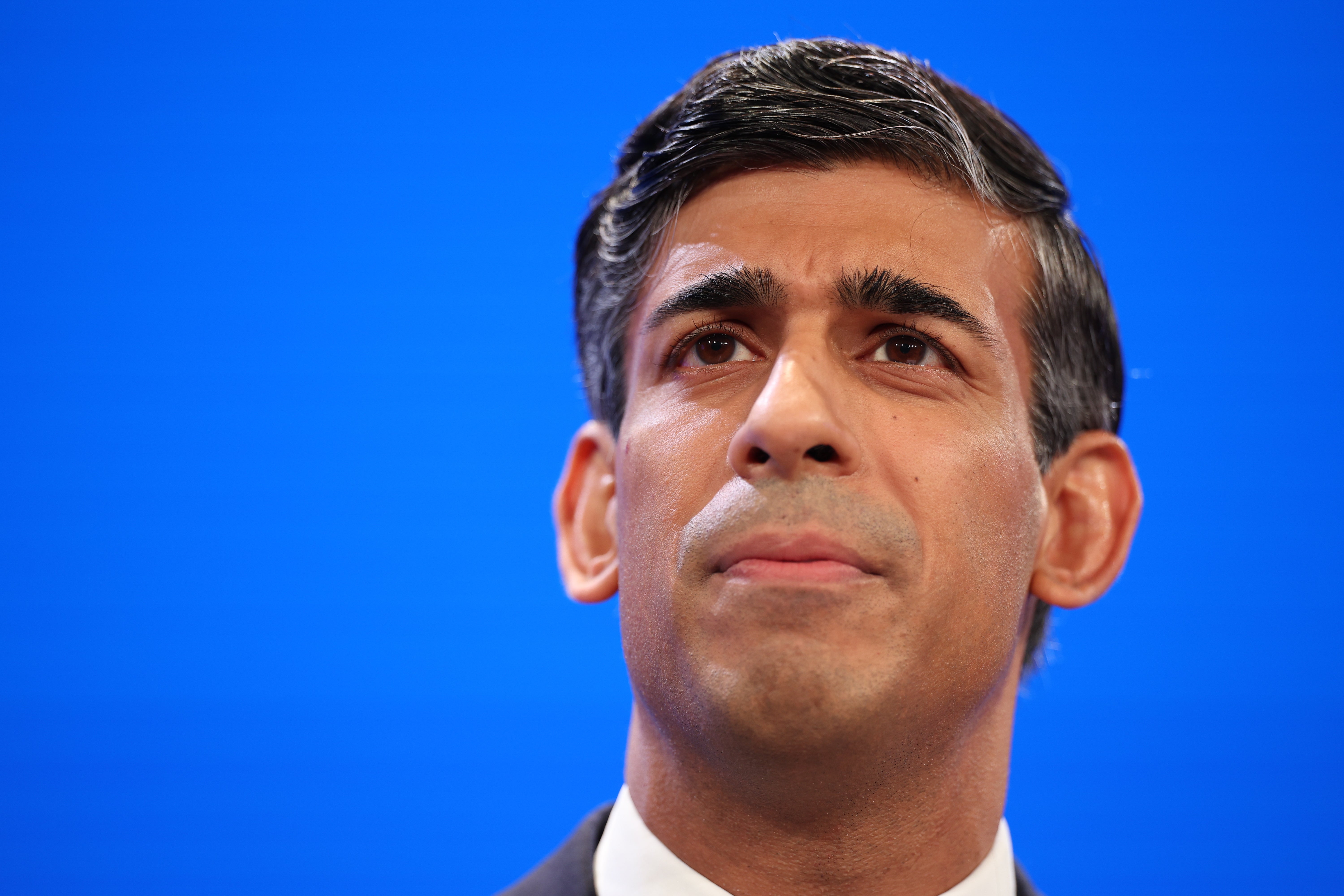With one speech, Sunak tore up the Tory rulebook and started all over again. Good for him...
‘Super’ Sunak is an agent of change and is spearheading a break with the past, writes Sean O’Grady – including, with his earth-scorching conference speech, the last 13 years of Tory rule...


What drove Rishi Sunak, the mild-mannered competent technocrat, to become an iconoclastic railway vandal? Like Clark Kent transforming into Superman, we have seen a new Sunak emerge in recent weeks, as if he’d popped into a phone box and jettisoned an awful lot of baggage in favour of a new way of doing politics. The “S” on his chest stands for Super Sunak – and he can fly!
He smashed the cross-party consensus on net zero, slammed the brakes on the “war on motorists”, and derailed HS2, a Tory flagship policy since the days when David Cameron and George Osborne were running the show. Indeed Sunak, a poodle-turned-XL bully, mauled all of his Tory predecessors and their administrations over the last 30 years – John Major, Ken Clarke, Micheal Heseltine, Cameron, Osborne, Theresa May, Philip Hammond, Boris Johnson, Jacob Rees-Mogg, Liz Truss, Kwasi Kwarteng – the whole lot of them.
Sunak denounced them for operating within a failed political consensus (which will be news to Johnson and Truss at any rate), and for institutional short-termism. No matter that Sunak was Johnson’s chancellor of the exchequer and, presumably, an enthusiastic Conservative from an early age.
Now “Super” Sunak is an agent of change, and a break with the past, including the last 13 years of Tory rule. Actually, he is not just “an” agent of change, but the agent of change, because the more obvious claimant to the title is Keir Starmer, who Sunak dismisses as “the walking definition of the political status quo of the last 30 years”.
Wanting to be the “agent of change” leading a British social and economic revolution may well be a perfectly understandable, though surprising, Damascene moment. It may be that he’s decided that the Conservatism of the last couple of decades was mistaken, though well-intentioned.
In that respect Sunak seems to be pointing to a change in direction for the party every bit as profound as that wrought by Thatcher and her mentor, Keith Joseph, when they took the party over in 1975. Joseph confessed, agonised, that he’d not really been a Conservative at all while he served in the Tory governments of Ted Heath and Harold Macmillan. Thatcher agreed that the post-war consensus, also spanning the previous three decades, had led Britain into a sorry decline, and things had to change. They spent the next few years nudging a reluctant parliamentary party in their direction, preparing the radical policies that would be implemented, at first gingerly, after 1979.
Of course it was far easier for them to do this, because it’s always simpler to ditch the past and rebuild in opposition. Sunak’s obvious problem with being an agent of change is that he’s trying to do so from within government, and after 13 years in power.
It’s also not entirely clear, aside from the mantra about “long term decisions”, what this revolution is all about. A smaller state? A low tax regime? Libertarianism? As his critics on the right never tire of reminding us, there is little sign of any of that.
It is difficult for Sunak to come in at this stage, change everything and denounce the past. Major had the same dilemma when he succeeded Thatcher. He succeeded in turning things around and winning in 1992 because he only changed the policies the party and country were really unhappy with – ditching the poll tax and a reset with Europe – and avoided attacking his predecessor.
Sunak’s approach seems if anything to be more violent, as if he was actively picking a fight with his predecessors, and of course Cameron and Osborne attacked him for scrapping the HS2 line to Manchester. Sunak is making bold decisions, executing U-turns and talking like a radical.
This may well be born out of frustration at the state the country is in; but there may well be a more basic political instinct at work – survival. His poll ratings are poor – even worse than Starmer’s – and he’s staring at a Labour landslide. The public mood is strongly “time for a change” and he has to place himself at the head of that trend.
He will be a footnote in history unless he does something, and he (or at least his team) has decided on this gamble. I’m intrigued by the suggestion by Joshi Herrmann on Unherd that all this has something to do with… Dominic Cummings, called in from the cold to help (also don’t forget Cummings thought HS2 was mad and rates Sunak far higher than Johnson, and basically made him chancellor in 2020).
According to Herrmann: “The advice from Cummings was bracing: shifting the public’s perceptions of Sunak would be incredibly difficult. He made clear that only very big, very noisy moves would have any chance of persuading people that Sunak is an agent of change. Number 10 needed to pick some big public fights; the more blowback from former prime ministers and big business figures the better. Or, as one insider characterised Cummings’s advice: ‘Do mental stuff that proves you’re not the Establishment’”.
And there we have it. Part out of conviction; part out of desperation; part out of expediency; the re-making of Sunak as Super Sunak is upon us. The 2024 Conservative manifesto should be an interesting read.
It might work. It might not. But it’s all Sunak and his party have got. If it all goes wrong, they can blame Dom. Again.






Join our commenting forum
Join thought-provoking conversations, follow other Independent readers and see their replies
Comments